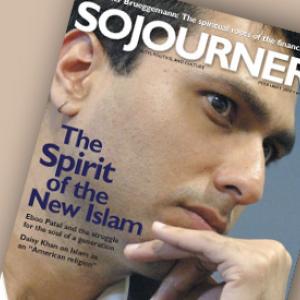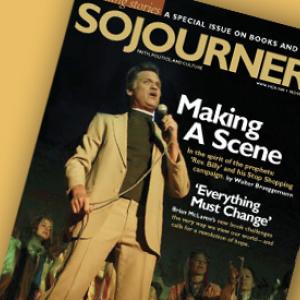
Walter Brueggemann (1933-2025), was a Sojourners contributing editor. He was the author of more than 100 books, including The Prophetic Imagination, and was an emeritus professor of Old Testament at Columbia Theological Seminary in Decatur, Georgia.
Posts By This Author
Trusting God's Inexplicable Goodness
Reflect;ion on the Revisd Common Lectionary, Cycle A: Transfiguration, False Desire to LIfe, Can We Start Again, and High-Water Mark.
What Does Our 'New Self' Look Like?
We enter into a season focused on Christ’s human possibility as a defiant alternative to the human self proposed by the dominant values of our culture.
Walking With the Light of the World
Reflections on the Revised Common Lectionary, Cycle A
Epiphany is the exhibit of Jesus in the world. The early church was utterly enthralled by Jesus, but did not find it so easy to characterize him. The early followers found that, in his radicality, he outran all of their explanatory categories. But they had to bear witness to him.
For that reason the early church readily appealed to the promissory texts of the Old Testament and found that they anticipated his coming. In the prophetic promises of Isaiah and Jeremiah they found expectations of Jesus. The early church found guidance and comfort in the ancient psalms that celebrated God’s role in lyrical doxology, that acknowledged God as light, and that commanded a neighborly life in the world.
After prophetic promise and psalmic solace and guidance, the church issued its own evangelical conviction that Jesus is the beloved of God, the Word become flesh, the light of the world. They piled up images and phrases, because none was fully adequate to the wonder of his presence. And after all of that imaginative rhetoric, they concluded that it comes down to conduct that reflects his intent. After all of the talk about Jesus, there is the walk. The early church was summoned to a new righteousness, to bold decisions, to vulnerability in the world that attested the new governance of Jesus. Since then, the church has been coming to terms with the reality of Jesus, the one with whom God is well pleased.
God's Reign Cracks into Our World
During November we reach the conclusion of the church year. We remember our dead and ponder the God of life. We begin Advent and the season of alert waiting for the newness that God will give.
Reflections on the Revised Common Lectionary, Cycle C
Reflections on the Revised Common Lectionary, Cycle C
The 'Low Holy Days' of Summer
A Season of Generosity and Gratitude
A Cast of Emancipated Characters
Refusing the Deathly World of Anxiety
Reflections on the Revised Common Lectionary, Cycle C
These readings mark the transition in the church year from Easter to Pentecost, and culminate with Trinity Sunday. This transition lets us focus on both the particularity of the Risen Christ, who gives life in the church, and the continuing force of the spirit of Christ that is alive and at work in the world. The doctrine of the Trinity is the church’s somewhat enigmatic attempt to witness to the linkage between the risen historical person and the worldwide force of God’s presence known in him.
The Power of Suffering Love
Reflections on the Revised Common Lectionary, Cycle C
Lent is 'Come to Jesus' Time

Photo via vetre / Shutterstock.com
Reflections on the Revised Common Lectionary, Cycle C
Wondrous, Inexplicable, Demanding Newness
Reflections on the Revised Common Lectionary, Cycle C
Getting Ready for the Unexpected
From Anxiety and Greed to Milk and Honey
Biblical faith invites us out of self-destruction toward God's generosity and abundance.
What Would Jesus Buy?
Rev. Billy and his "Church of Stop Shopping" preach the gospel of love, anti-consumerism, and radical neighborliness.
Secretary of Woe
What God and the genius of capitalism have in common: a Bible study on the book of Job
Former Treasury Secretary Paul H. O'Neill, an embarrassment to the Bush administration, was among the first to comment publicly on the Enron debacle in 2002, with a sound bite that is likely to endure as a signature statement of the market ideology of the Bush years:
"Companies come and go; it is part of the genius of capitalism."
The comment was a powerful disclosure of the governing ideology of our society. We may observe of that sound bite:
1) O'Neill spoke without any hint of irony. He seemed genuinely to believe his own mantra.
2) At the same time, however, we had to credit O'Neill, a consummate insider, with an immense cover-up in his utterance. He innocently suggested that capitalism is an unfettered system that operates unencumbered, all by itself. O'Neill, however, did not live in a bubble of isolation. He undoubtedly knew of the multiple covert manipulations by the key market players in their influence upon government, whereby the cards are stacked for the big ones and against the little ones.
3) One is struck in his sound bite by a remarkable lack of empathy for those who genuinely lose and suffer when "companies go," for the "going" is not simply a statistical fluctuation, but a huge displacement that includes loss of job and savings, and often thereby loss of home. O'Neill's dismissive slogan continued:
"Part of the genius of capitalism is people get to make good decisions or bad decisions, and they get to pay the consequences or to enjoy the fruits of their decisions."
A Story of Loss and Hope
The book of Isaiah is like a great fugue, always advancing to fresh statements, at the same time continually returning to pick up and restate themes already sounded.


